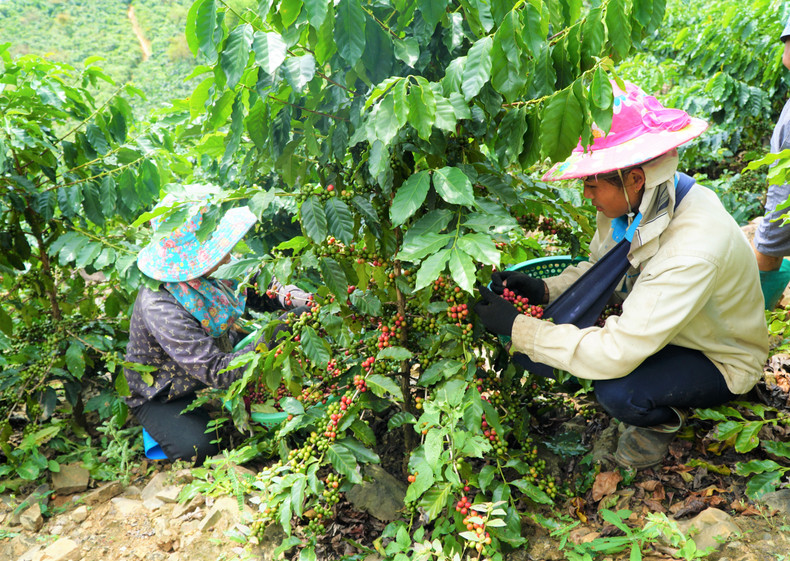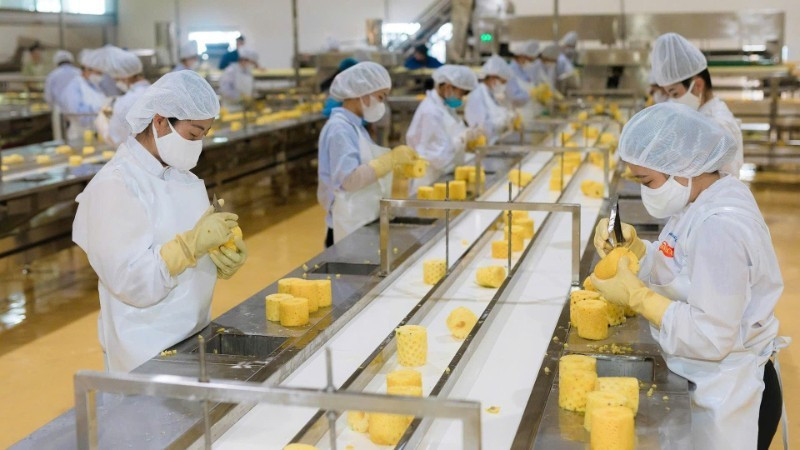However, production remains small-scale and fragmented, limiting overall value. Establishing raw material farming areas that meet export standards, strengthening value chain linkages, and advancing processing technologies are essential steps to enhance the added value of agricultural products across the region.
Expanding high-value crop production
According to Cam Thi Phong, Deputy Director of the Son La Provincial Department of Agriculture and Environment, the province currently boasts nearly 85,050 hectares of fruit trees, yielding an annual output of 510,000 tonnes.
It also has 35,563 hectares of perennial industrial crops, producing over 102,000 tonnes annually.
The province has prioritised the development of key crops such as mango, longan, plum, coffee, and tea.
By 2030, Son La aims to stabilise 90,000 hectares of fruit trees with an output of 765,000 tonnes per year; cultivate 25,000 hectares of coffee yielding 40,000 tonnes annually; develop 5,950 hectares of specialty coffee; and increase the proportion of land applying VietGAP standards, water-saving irrigation technologies, regional codes, and deep processing methods.
Son La aspires to become the agricultural processing hub of the Northwest. The province currently holds 216 planting area codes for export, and operates 201 production, processing, and safe fruit business chains, covering a total of 4,502 hectares with an annual output of approximately 54,207 tonnes. The area of crops certified under VietGAP standards stands at 5,596 hectares.
Establishing raw material farming areas that meet export standards, strengthening value chain linkages, and advancing processing technologies are essential steps to enhance the added value of agricultural products across the Northwest region.
Specifically for coffee, 23,448 hectares have received sustainable certification, with an estimated output of 28,000 tonnes. To promote agricultural product processing, the province has nearly 560 processing facilities, close to 3,000 longan drying establishments, and 40 cold storage warehouses to support processing needs.
In Dien Bien Province, Lo Hong Phong, Deputy Director of the provincial Department of Agriculture and Environment, stated that with favourable climate and soil conditions, Dien Bien holds significant potential for cultivating economically valuable crops such as mango, grapefruit, pineapple, macadamia, coffee, tea, and rubber.
In terms of industrial crops, the province has nearly 4,800 hectares of coffee, over 5,000 hectares of rubber, and more than 12,300 hectares of macadamia. Fruit production amounts to around 1,420 tonnes of fresh fruit. The province is currently initiating the construction of an agricultural product processing facility.
In Lai Chau Province, the primary agricultural development focus is on cultivating endemic medicinal plants. The province currently has over 23,000 hectares of various medicinal plants, including more than 10,000 hectares of cinnamon, over 6,500 hectares of cardamom, upwards of 2,000 hectares of hawthorn, and more than 130 hectares of Lai Châu ginseng.
The annual harvest of medicinal plants in Lai Chau is estimated at 3,000 tonnes, underscoring the province’s potential in this sector.
Building sustainable raw material farming areas to boost export potential

Although each Northwest locality possesses unique strengths in agricultural development and has achieved notable progress in recent years, the region’s agriculture sector continues to face challenges.0
These include fragmented production, high costs, climate change impacts on yield and quality, low levels of deep processing, packaging and labelling that fall short of export requirements, weak links between farmers and enterprises, and limited logistics infrastructure.
Vu Thi Van Phuong, General Director of VietRAP Investment and Trading Joint Stock Company, suggested that to enhance agricultural production efficiency in the Northwest, it is vital to establish concentrated raw material farming zones with strong linkages between farmers, cooperatives, and enterprises.
For instance, medicinal plants require stringent cultivation processes and extended growing periods. Therefore, developing raw material farming zones is crucial, based on selecting suitable crops and quality varieties, securing purchasing units, and investing in packaging and labelling improvements.
Currently, VietRAP is implementing a cultivation model that integrates cooperative management with enterprise product contracts.
Building raw material farming zones is a fundamental prerequisite for producing quality agricultural products for the market. Without these zones, value chains cannot be formed.
Deputy Minister of Agriculture and Environment Tran Thanh Nam
Specifically, in developing medicinal plant cultivation areas in Van Ho, Son La Province, the company has partnered with three key cooperatives and hundreds of households. After three years, the cultivation area has expanded to 60 hectares, including 20 hectares now in their fourth harvest cycle.
The company also aims to support ethnic minority communities in economic development through medicinal plant cultivation and is exploring the development of herbal-based beverage products.
Echoing the importance of raw material farming zone development, Ngo Minh Hai, Chairman of TH Group’s Board of Directors, noted that the primary challenge in advancing Northwest agriculture lies in securing quality raw materials. TH Group has established strict quality standards for all input materials and must select suppliers who meet these criteria.
Citing Son La’s success in developing 50,000 hectares of standardised pineapple and passion fruit raw material zones, Tran Thanh Nam, Deputy Minister of Agriculture and Environment, emphasised that building raw material farming zones is a fundamental prerequisite for producing quality agricultural products for the market. Without these zones, value chains cannot be formed.
Therefore, in the near future, localities must invest in raw material zones - from seed varieties and standardised cultivation processes to infrastructure - to effectively manage agricultural product value chains.
















